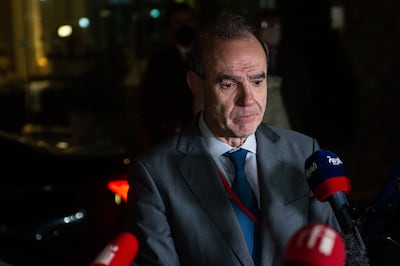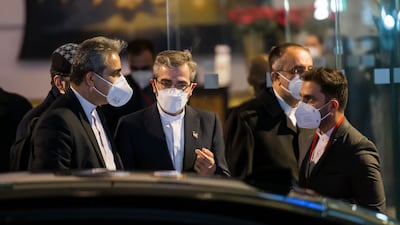French President Emmanuel Macron has urged his Iranian counterpart Ebrahim Raisi to ensure Iran respects its 2015 nuclear deal obligations after Tehran made a series of maximalist demands only a day into talks aimed at salvaging the accord.
Hours after sitting down with international representatives in Vienna, Iran’s leading nuclear negotiator made bold demands, which could prevent the 2015 agreement from being restored. These included assurances of protection against further US sanctions.
In a call to Mr Raisi late on Monday night, Mr Macron said France wanted both Iran and the US to return to the commitments laid out in the nuclear deal.
He also “underscored the need for Iran to engage constructively in this direction so that the exchanges allow a swift return to the agreement”, the French presidency said.
“Iran must return without delay to compliance with all its commitments and obligations … and quickly resume cooperation that allows the [UN atomic] agency to fully carry out its mission.”
Mr Raisi's office said he urged Mr Macron “to strive with other parties in Vienna to conclude the negotiations and lift the sanctions against Iran”.
“Sending a full team to the talks shows Iran's serious will in these talks,” Mr Raisi said.
“Those who have started to violate the nuclear deal must gain the confidence of the other party for the negotiations to proceed in a real and fruitful manner,” he said, referring to the US.
In a segment broadcast on Iranian state TV, Ali Bagheri Kani, Iran's envoy to the Vienna talks, referred to the previous rounds of negotiations as a mere “draft” and said “drafts are subject to negotiation".
“Therefore nothing is agreed on unless everything has been agreed on,” he said.
“On that basis, all discussions that took place in the six rounds are summarised and are subject to negotiations. This was admitted by all parties in today’s meeting as well.”
Another clip showed Mr Kani in the Austrian capital demanding a “guarantee by America not to impose new sanctions” or not reimpose previously lifted sanctions.
Speaking to Iran’s state-run IRNA news agency, Mohammed Eslami, Iran’s civilian nuclear chief, reiterated Mr Kani’s demand.
“The talks are about the return of the US to the deal and they have to lift all sanctions and this should be in practice and verifiable,” Mr Eslami said.
The deal, known officially as the Joint Comprehensive Plan Of Action and negotiated under former US president Barack Obama, was hailed as a historic agreement that would make the world safer.
Mr Obama's successor Donald Trump was highly critical of the package, however, calling it the “worst deal ever”.

After entering the Oval Office, Mr Trump withdrew the US from the deal in 2018 as part of his “maximum pressure” campaign against Iran.
Iran now enriches small amounts of uranium of up to 60 per cent purity — a short step from weapons-grade level of 90 per cent. Iran also spins advanced centrifuges barred under the accord and its uranium stockpile now far exceeds agreed limits.
US President Joe Biden has said America is willing to re-enter the deal, though the negotiations continue with US officials involved only remotely as has been the case for previous rounds of talks since Washington’s withdrawal.
Talks in Vienna resumed Monday after a hiatus during which led to Mr Raisi taking power in Tehran. Mr Raisi, a protégé of Ayatollah Ali Khamenei, Iranian Supreme Leader, campaigned for the lifting of sanctions. However, fellow hardliners do not trust the nuclear deal, which they regard as giving too much to the West.
The comments made by Mr Kani and Mr Eslami were in stark contrast to the optimistic tone projected by the EU diplomat leading the talks.
“I feel positive that we can be doing important things for the next weeks,” Enrique Mora told reporters on Monday.
Mikhail Ulyanov, Russia’s top representative at the talks, tweeted on Tuesday that the resumption of negotiations was “quite successful”.
“Participants decided to continue without delay the drafting process in two working groups — on sanctions-lifting and nuclear issues,” he wrote. “This work starts immediately.”
Israel, Iran’s regional, nuclear-armed arch rival, kept up its own pressure as Prime Minister Naftali Bennett, in a video address, delivered to nations negotiating in Vienna, said Iran was trying to “end sanctions in exchange for almost nothing”.
“Iran deserves no rewards, no bargain deals and no sanctions relief in return for their brutality,” Mr Bennett said in the footage that he later posted on Twitter. “I call upon our allies around the world: Do not give in to Iran’s nuclear blackmail.”
Iran maintains its atomic programme is peaceful. However, US intelligence agencies and international inspectors say Iran had an organised nuclear weapons programme up until 2003.
Non-proliferation experts fear the brinkmanship could lead to Tehran adopting even more extreme measures to try to force the West to lift sanctions.
Making matters more difficult, UN nuclear inspectors remain unable to fully monitor Iran’s programme after Tehran limited their access. No progress was achieved during a trip to Iran last week by the head of the International Atomic Energy Agency, Rafael Grossi.


